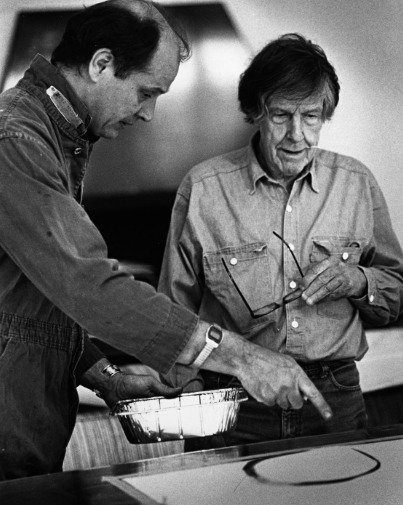Every Day is a Good Day
dal 24/9/2010 al 13/11/2010
Segnalato da
24/9/2010
Every Day is a Good Day
Kettle's Yard, Cambridge
The Visual Art of John Cage. The exhibition contains over 100 drawings, prints and watercolours of Cage, including the extraordinary Ryoanji series, described by the art critic David Sylvester as 'among the most beautiful prints and drawings made anywhere in the 1980s'.

John Cage was one of the leading avant-garde composers of the twentieth
century, most famous perhaps for his silent work of 1952, 4'33". Cage
was closely connected with art and artists throughout his long career,
but it was not until he was in his mid-sixties that he began to practice
seriously as a visual artist himself. In the last fifteen years of his
life, Cage produced over 600 prints with the Crown Point Press in San
Francisco, as well as 260 drawings and watercolours. In these works he
applied the same chance-determined procedures that he used in his
musical compositions.
*This is the first major retrospective in the UK of the visual art of
the American composer and artist John Cage *(1912--1992). The exhibition
will contain over 100 drawings, prints and watercolours, including the
extraordinary /Ryoanji/ series, described by the art critic David
Sylvester as 'among the most beautiful prints and drawings made anywhere
in the 1980s'. In these works he drew around the outlines of stones
scattered (according to chance) across the paper or printing plate, in
one case drawing around 3,375 stones. He also experimented with burning
or soaking the paper, and applied complex, painstaking procedures at
each stage of the printmaking process.
Inspired by Cage's use of chance-determined scores, the exhibition will
differ markedly from a traditional exhibition. The procedure that Cage
often employed, using a computer-generated random number programme
similar to the Chinese oracle, the 'I Ching', has been used to determine
the number of works on show, their position on the wall and how many
changes may occur during the exhibition. At Kettle's Yard, the
exhibition will change three times but all the works will be on display
all the time. The familiar aesthetic and narrative concerns of the
artist or curator will be markedly absent from the exhibition, allowing
for chance encounters between works and the space they are in. Cage, who
disliked linear displays, employed this method in several exhibitions,
notably /Rolywholyover/, in Los Angeles in 1992, which he described as a
'composition for museum'. He said "I use chance operations instead of
operating according to my likes and dislikes," thus avoiding
preconceived ideas in order to be open to possibilities that he might
not naturally consider.
Alongside the exhibition will be a lively programme of events, including
a 'musicircus' on November 10, a series of talks on Saturdays in October
dealing with some of the wide range of subjects that interested Cage,
such as randomness and risk, Japanese gardens and tea-houses, board
games (Cage played chess with Duchamp) and electronic music. There will
also be half-term activities for families, a fungi hunt (Cage was a keen
mycologist), and the UK premiere of One13, a work for cello to be played
with a curved bow.
The book to accompany the exhibition is the first publication to cover
all aspects of Cage's visual art, with more than sixty plates and other
illustrations, and four interviews by curator Jeremy Millar with
authorities on Cage's visual art work, all of whom knew him well. It
also includes a substantial extract from the art critic Irving Sandler's
1966 interview with Cage, and a 'Cage Companion' of quotations and
commentaries reflecting the range of his interests and concerns over
sixty years, from 'Anarchy' to 'Zen'.
*John Cage: Every Day is a Good Day *has been conceived by Jeremy Millar
and is organised by Hayward Touring and BALTIC with the close support
and guidance of the John Cage Trust.
Following its presentation at Kettle's Yard the exhibition will tour to
Huddersfield Art Gallery, the Hunterian Art Gallery, Glasgow and the De
La Warr Pavilion, Bexhill-on-Sea.
*NB there will be an opening event - a conversation between Ray Kass,
artist and founder of the Mountain Lake Workshop and Laura Kuhn Director
of the John Cage Foundation* *at 5.15pm on Saturday 25 September.*
Opening Saturday 25 September 2010, 5.15pm
Kettle's Yard
Castle Street, Cambridge
Hours: Tues-Sun 11.30-5pm
Admission free



